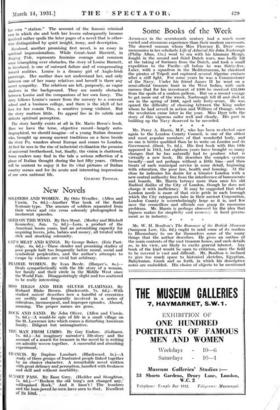Some Books of the Week
ADMIRALS in the seventeenth century had a much more varied and strenuous experience than their modern successors. The shrewd seaman whom Miss Florence E. Dyer com- memorates in her scholarly Life of Admiral Sir John Narbrough (Philip Allan, 13s.) went to sea with his kinsman Myngs, fought in the second and third Dutch wars, was badly hit at the taking of Surinam from the Dutch, and took a small expedition to the Pacific—all before he was thirty-five. Later, with a squadron in the Mediterranean, he chastised the pirates of Tripoli and captured several Algerine cruisers after a stiff fight. For sonic years he was a Commissioner of the Navy. Under his friend James II he went on a semi-official treasure hunt in the West Indies, with such success that for his investment of £300 he received E32,000 from the spoils of a sunken galleon. But on a second voyage to get more out of the wreck, Narbrough fell ill and died at sea in the spring of 1688, aged only forty-seven. He was spared the difficulty of choosing between the King under whom he had served_ in action and William of Orange, when the revolution came later in the year. Miss Dyer tells the story of this vigorous sailor well and clearly. His part in building up the Navy deserved to be recorded.























































 Previous page
Previous page